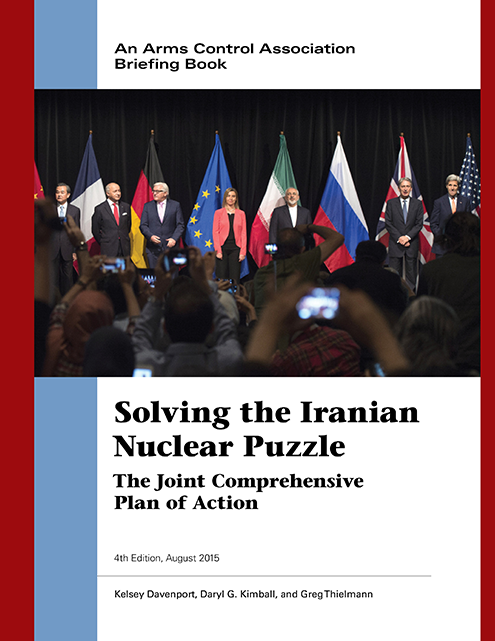August 2015
For well over a decade, the sensitive nuclear fuel-cycle activities of the Islamic Republic of Iran have been at the center of international concerns about the further spread of nuclear weapons.
On July 14, negotiators from the P5+1 (China, France, Germany, Russia, the United Kingdom, and the United States) and Iran secured a comprehensive nuclear agreement—the Joint Comprehensive Plan of Action (JCPOA)—which is designed to verifiably block Iran’s pathways to nuclear weapons development and guard against a clandestine weapons program in exchange for sanctions relief.
This is the fourth and substantially revised edition of our “Solving the Iranian Nuclear Puzzle” briefing book. This volume includes
- a summary of the history and status of Iran’s nuclear program,
- a review of the impact and record of the 2013 interim agreement,
- a detailed summary and explanation of the JCPOA,
- answers to more than two-dozen frequently asked questions, and
- a summary of the Iran-IAEA work plan on verification and compliance issues.
Our briefing book is intended to improve public and policymaker understanding of this complex agreement with far-reaching consequences for the nuclear nonproliferation regime and for international peace and security.
UPDATE, February 2021: As an update to the original 2015 report, the ACA policy staff has produced the following three factsheets on the key components of the JCPOA, the verification and monitoring provisions that apply to Iran’s nuclear activities, and the steps necessary to restore compliance with the JCPOA following the U.S. withdrawal in 2018 and Iran’s subsequent retaliatory breaches of key nuclear limits.
- The Joint Comprehensive Plan of Action: An Effective Verifiable Nuclear Deal
- Monitoring Iran’s Nuclear Activities: NPT and JCPOA Requirements
- Restoring the JCPOA’s Nuclear Limits
This report was made possible by the generous support of our members and donors, without which this report would not have been possible. In particular, we wish to thank the Carnegie Corporation of New York, the William and Flora Hewlett Foundation, the John D. and Catherine T. MacArthur Foundation, the Ploughshares Fund, and the Prospect Hill Foundation, which provide support for our research and public education programs on nuclear nonproliferation issues.

